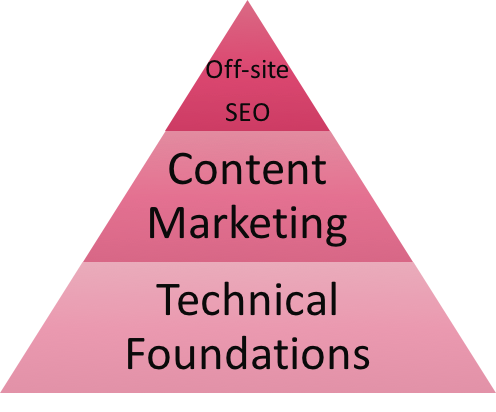
In the digital marketing sector we frequently talk about content and technical SEO as two distinct sections of marketing we can do on-site.
But that’s not entirely true. The two elements work hand-in-hand on a website to support its organic successes.
I think primarily the reason is that two separate skill sets are required to deliver the work. For a brand hiring an ‘SEO’ it’s rare they’ll be able to find one person who is equally strong in both content and technical work, so instead they must prioritize which one is the most important to them.
I don’t think that content vs. technical SEO is an either/or battle. Instead, it’s more about the ratios and weighting we put towards each side for the duration of an SEO project.
It’s an annoying cop-out, but when asked, “What’s more important: content, or technical?” the answer genuinely is, “It depends.” It depends on the current performance of your site, the speed at which you want results, the size of your business and how much you’ve previously done.
Let’s look at each one of these categories, and consider whether content or technical SEO is the best solution for various issues you might encounter.
Current performance
The area of SEO to invest your money in really depends on how well the site is doing and where it is under-performing to begin with.
The balance of if technical or content is the solution will depend on which area of the site performance you’re trying to target:
- Struggling with site-wide rankings: Typically this is the result of an underlying technical issue, so technical SEO should be the priority area to focus upon.
- Internal cannibalization: If rankings are low because you frequently have multiple pages trying to rank for the same keyword, then one effective solution is to look at and edit the content on these pages.
- Product pages (with multiple configurations) not ranking: If a product page has multiple options to it in color/shape/size/style, and all of these are controlled by the user, it’s likely that a technical issue is causing inefficient crawling or indexing of these products.
- Product pages with affiliates/stockists not ranking: If you’re selling another brand’s products, or work with affiliates or stockists of your products, when these are under-performing online, it’s often the result of duplicate content issues externally. The best solution here is to revise your content and optimize what is currently on your site.
Speed of results
It’s hard to know whether content or technical will get you the fastest results online, as it really depends upon the site you’re working on.
A site which is not being frequently and efficiently crawled will struggle to get technical changes noticed on-site, but also will rarely get new content indexed quickly or highly to begin with. To speed up the result you get from content pieces, it’s important to have already implemented the technical work required for Google to efficiently crawl and index the site.
This means that in cases where technical SEO already meets a minimum standard, content will get faster results than additional technical work and vice versa. Again, this needs a big caveat that is completely site dependent.
However, content has a major advantage in gaining results quickly without relying on SEO, as it can gain traction across other channels (e.g. social media) and support the branding of the business.
Whilst content marketing may come out of your SEO budget, there’s nothing to stop you using paid social as a means of promotion, email marketing or even just directing in store clients to your online resources. This means you get extra value from a single piece of content, which may be struggling to perform organically.
Previous work
As with every type of marketing, there is to some extent a Law of Diminishing Returns when it comes to technical SEO and content marketing.
The biggest results can be obtained when you make that first investment into either technical or content, if they are areas you’ve never branched into before. This means it’s key to consider the activities that have been done on the site before.
A site with no historic technical work may take some time for Google to pick up the changes made on-site; however, the impact will be huge compared to a small tweak on a much more well-established site.
The same applies to content: if there is very little established content on-site, or suitable information for consumers, then the initial pieces will have the largest impact.
A general rule
Whilst this is by no means applicable to every website, one common way to approach SEO is to view it as a pyramid of website’s needs.
Whilst technical sits at the base with the largest investment, it’s not necessarily the most important in the long-term.
As the website evolves, the time spent on each aspect will switch to focus on content marketing and off-site efforts, on the assumption that the technical foundations for SEO and speed for content delivery are already in place on the site.
Of course, when a change then impacts how we serve content to users, or Google’s algorithm updates, we often have to start again at the bottom of the pyramid.
Related reading
For years, short-tail and transactional keywords were the primary focus of SEO campaigns. However, there is a clear acknowledgement on both sides of the fence with regards to the power of long-tail keywords. So how can we adapt keyword research in relation to this focus on identifying great long-tail keywords?
Driving traffic to a blog has never been easy, and there’s no magic bullet to achieve it. However, taking certain steps can significantly increase your chances of earning blog traffic and – hopefully – turning a profit with your blog.
Much like the world of search and the perpetually updated algorithms of Google, the landscape of non-Google marketing sees techniques, platforms and priorities change over time. What hasn’t changed is the importance of understanding how to generate traffic without Google. Google is big, but it is not good to concentrate all your efforts into just one referrer.
Structured data is a core SEO tactic. Not only does it remove a layer of ambiguity for search engines (they don’t have to infer what a piece of data is; you’re telling them outright), it’s also the engine that drives rich results, which are taking up an increasing amount of real estate in the SERPs.
https://searchenginewatch.com/2018/04/05/technical-seo-vs-content-marketing-which-should-seos-focus-on/






